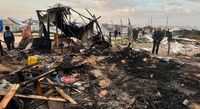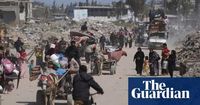The ongoing conflict in Gaza has escalated dramatically following the end of a two-month ceasefire, leading to a surge in bombings and displacement as both sides brace for further violence.
On Wednesday, March 19, 2025, Israeli bombardments across Gaza continued with alarming intensity, claiming hundreds of lives, many of whom were women and children. The situation has drawn sharp condemnation and concern from international aid agencies and officials.
The UN Office for the Coordination of Humanitarian Affairs (OCHA) reported that in a panic-induced move, flyers were dropped on residents of Beit Lahiya and Beit Hanoun, ordering them to evacuate their homes as bombings intensified. This mass fear has resulted in thousands being displaced in a matter of days, leading to desperate searches for shelter among the ruins of their homes.
UN Special Advisers Virginia Gamba and Mô Bleeker expressed grave concerns over what they termed an "irreversible escalation" as Israeli forces ramp up efforts to de-escalate Hamas's influence, particularly over the hostages taken during the ongoing hostilities.
In an emotional briefing, UN Deputy Spokesperson Farhan Haq addressed the rising death toll and displacement: "Thousands of people have already been displaced," he stated, urging a halt to violence and emphasizing the need for a political solution to the crisis.
With ongoing combat, many families have fled from eastern to western Khan Younis, seeking refuge with relatives or in open areas amidst the ever-growing refugee crisis. Reports indicate that displaced individuals are flocking to UNRWA-run schools in Gaza City and other safer zones, hoping to find refuge from the surging violence.
In a concerning report by OCHA, military operations by Israeli forces are expanding into new areas. A morning raid on March 19 targeted the Ein Beit el Ma refugee camp in Nablus, where residents were ordered to vacate their homes under threat of violence. Approximately 45 families fled preemptively, fearing long-term military operations in their area.
The humanitarian situation is becoming dire, with the blockade on Gaza continuing unabated for 18 days, severely interrupting relief efforts. Essential goods, including food, clean drinking water, clothing, and blankets, are critically scarce. Humanitarian organizations are reporting halted food distributions due to security issues and the looming danger of evacuation zones. Around 30 community kitchens were forced to shut down, with many remaining closed as the threat of violence intensifies.
As the bombardments persist, everyday life has turned into a struggle for basic survival. Many residents throughout Gaza, including those in the makeshift camps in al-Mawasi, have shared their heart-wrenching stories. Osama, a 40-year-old aid worker, described the situation. "Our hopes rose but now we are back to square one," highlighting how swiftly they returned to despair following the ceasefire's collapse.
The UN has reported that more than 160,000 individuals have been directed to leave their homes, adding to the already significant population of displaced persons. Amidst the chaos, the local health officials stated that the situation is deteriorating considerably, as they record casualties from intensified shelling. On Tuesday alone, over 400 people were killed, with the death toll rising continually as bombings rage through Wednesday.
A heavy airstrike on March 18 marked the continuation of hostilities after the ceasefire, and subsequent attacks on March 19 resulted in at least 20 additional fatalities. The conditions have worsened as Israeli Defense Minister Israel Katz declared that military forces prepare to intensify attacks if Hamas does not release hostages. Katz stated, "Residents of Gaza, this is the last warning. Take the advice of the president of the United States [and return the hostages]." Many residents interpret these announcements as harbingers of even greater violence.
Amid these dire circumstances, ordinary Palestinians live in a constant state of fear and uncertainty, with millions being indefinitely displaced due to recurring evacuation orders. Khatam al-Kafarna, a nurse, lamented her ninth forced evacuation, explaining, "There is no aid, no food, no bread, no water, no privacy. The reality is harsh."
As prices for basic necessities soar amid panic buying, many families struggle with the increasing cost of food. A kilo of potatoes has risen to the equivalent of $5, forming a significant burden for those already facing financial disaster. Aid officials have warned that though significant aid arrived during the ceasefire, reserves are dwindling, threatening an impending humanitarian disaster should the violence continue.
As public anger boils over, protests erupted in Jerusalem against Prime Minister Benjamin Netanyahu and his handling of the ongoing war. Tens of thousands of demonstrators took to the streets on Wednesday, calling for an end to hostilities and expressing discontent with the government’s policies which they claim exacerbate the crisis.
Many protesters criticized the government's decisions to remove key judicial and security officials, leading to tumultuous clashes with law enforcement. At least 12 protesters were arrested as the unrest spread through the streets during the day and into the night. During these protests, a taxi driver ran into a demonstrator, injuring the protester, who later reported being robbed of their possessions amidst the chaos.
Opposition leaders, including Yair Lapid, decried Netanyahu’s government as “illegitimate” and urged citizens to rally against the current state of affairs. Demonstrators voiced their frustration through strong chants and signs that called for action to spare remaining hostages in Gaza, emphasizing the need for a better approach to the ongoing conflict.
As Gaza stands on the brink of further escalation, the world watches and waits for signs of hope amid rising tension, ensuring voices for peace reach beyond the rubble and devastation. The United Nations has reiterated its urgent calls for protection and immediate assistance to civilians caught in the crossfire, as the looming threat intensifies.



